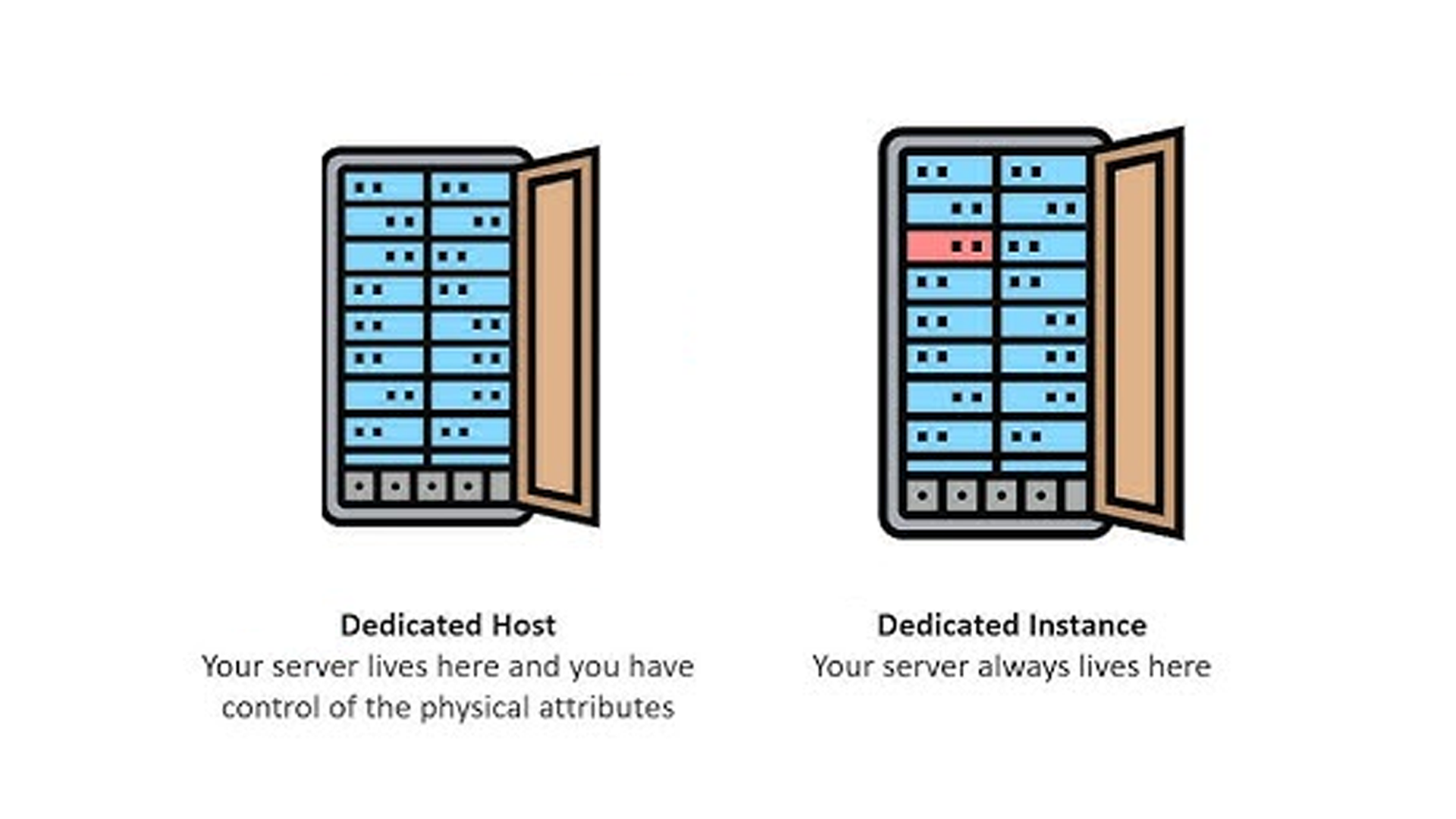In the world of cloud computing and web hosting, two terms often come into play: dedicated host and dedicated instance. These terms represent distinct approaches to allocating resources for your applications and websites. To make the right choice, it's essential to understand the differences, advantages, and use cases of each. In this comprehensive blog post, we will dive into the dedicated host vs. dedicated instance debate and help you make an informed decision for your hosting requirements.
Understanding Dedicated Hosts
What Is a Dedicated Host?
A dedicated host is a physical server allocated exclusively for your use within a cloud infrastructure. It offers the highest level of isolation and control over your computing resources. With a dedicated host, you have the entire server to yourself, allowing you to deploy virtual machines (VMs) or instances as needed.
Advantages of Dedicated Hosts:
- Isolation: Dedicated hosts provide a high degree of isolation from other users, minimizing the risk of "noisy neighbor" issues that can impact performance.
- License Compliance: In some cases, software licensing requires dedicated server hosting hardware. A dedicated host can help you ensure compliance with licensing agreements.
- Security: Enhanced security is possible with dedicated hosts because you have complete control over the underlying hardware and network configurations.
- Predictable Performance: Since you are the sole user, you can predict and manage the server's performance more effectively.
Use Cases for Dedicated Hosts:
- Mission-Critical Applications: Organizations that run mission-critical applications requiring optimal performance and security often opt for dedicated hosts.
- Data Privacy: When strict data privacy and compliance requirements must be met, dedicated hosts are a preferred choice.
Understanding Dedicated Instances
What Is a Dedicated Instance?
A dedicated instance, on the other hand, is a virtual machine (VM) that runs on a shared physical server. Unlike a dedicated host, where the entire server is allocated to you, dedicated instances share the server's hardware resources with other users. However, your instances run in isolation from instances owned by other users.
Advantages of Dedicated Instances:
- Cost-Efficiency: Dedicated instances are typically more cost-effective than dedicated hosts because resources are shared hosting, allowing you to pay only for what you use.
- Scalability: Dedicated instances offer scalability as you can quickly provision and de-provision VMs to match your workload.
- Resource Allocation: You can allocate resources such as CPU, memory, and storage as needed, optimizing costs.
- Flexibility: Dedicated instances are well-suited for a wide range of applications and workloads.
Use Cases for Dedicated Instances:
- Web Hosting: Small to medium-sized websites and applications can benefit from dedicated instances for their flexibility and cost-efficiency.
- Development and Testing: Dedicated instances are ideal for development and testing environments where resource requirements vary.
Choosing the Right Option: Dedicated Host or Dedicated Instance
The choice between a dedicated host and a dedicated instance ultimately depends on your specific hosting requirements. Here are some key considerations to guide your decision:
- Performance Requirements: If you require consistent and high-performance levels, dedicated hosts may be the better choice due to the absence of resource-sharing.
- Cost Constraints: If cost-efficiency is a primary concern, dedicated instances allow you to pay for the resources you use without the overhead of an entire server.
- Scalability Needs: Consider your scalability needs. Dedicated instances offer greater flexibility in rapidly adjusting resources up or down.
- Compliance and Security: For applications demanding strict compliance or enhanced security, dedicated hosts provide more control over the underlying infrastructure.
- Resource Allocation: Evaluate how you intend to allocate resources. Dedicated hosts offer fixed resource allocations, while dedicated instances allow for dynamic allocation.
Conclusion
In the dedicated host vs. dedicated instance debate, there is no one-size-fits-all answer. Your choice should align with your specific hosting requirements, budget constraints, and scalability needs. Carefully assess your use case and consider factors such as performance, cost, security, and resource allocation to determine whether a dedicated host or dedicated instance is the right fit for your organization. Both options offer unique advantages, so making an informed decision is crucial to achieving hosting success.
Frequently Asked Questions (FAQs) on Dedicated Host vs. Dedicated Instance
1. What is a dedicated host, and how does it differ from a dedicated instance?
- A dedicated host is a physical server allocated exclusively for your use within a cloud infrastructure, providing complete isolation.
- A dedicated instance, on the other hand, is a virtual machine (VM) that runs on shared hardware but operates in isolation from other instances.
2. When should I choose a dedicated host over a dedicated instance?
- Consider dedicated hosts when you need optimal performance, strict security, and compliance adherence, as they offer complete control over resources and hardware.
3. What are the advantages of dedicated hosts?
- Advantages of dedicated hosts include resource isolation, license compliance, enhanced security, and predictable performance.
4. What are the advantages of dedicated instances?
- Dedicated instances are cost-effective, scalable, and flexible, making them suitable for a wide range of workloads.
5. Are dedicated hosts more expensive than dedicated instances?
- Yes, dedicated hosts are typically more expensive because they provide exclusive access to physical servers, while dedicated instances share hardware resources.
6. Can I resize resources easily with dedicated hosts and dedicated instances?
- With dedicated instances, you can resize resources like CPU and memory more flexibly to match your workload. Dedicated hosts offer fixed resource allocations.
7. Which option is better for web hosting and small to medium-sized applications?
- Dedicated instances are often a better fit for web hosting and smaller applications due to their cost-efficiency and scalability.
8. Are dedicated hosts or dedicated instances more suitable for development and testing environments?
- Dedicated instances are well-suited for development and testing environments, where resource requirements may vary and scalability is essential.
9. How do I ensure compliance and data security with my hosting choice?
- Dedicated hosts provide a higher degree of control over hardware, making them ideal for ensuring compliance and data security.
10. Can I use a combination of dedicated hosts and dedicated instances in my cloud infrastructure?
- Yes, you can use both dedicated hosts and dedicated instances within the same cloud environment to meet various application requirements and cost considerations.
11. Are there any specific use cases where dedicated hosts are recommended?
- Dedicated hosts are recommended for mission-critical applications, data privacy-sensitive workloads, and scenarios requiring consistent and high performance.
12. How can I migrate from dedicated instances to dedicated hosts or vice versa if my needs change?
- Cloud service providers typically offer migration tools and services to help you transition between hosting options based on your evolving requirements.
13. Can I combine dedicated hosts and dedicated instances to optimize my cloud infrastructure costs?
- Yes, combining both options allows you to balance performance, cost-efficiency, and resource allocation effectively in your cloud environment.
14. What factors should I consider when making the choice between dedicated hosts and dedicated instances?
- Key factors include performance requirements, cost constraints, scalability needs, compliance and security considerations, and resource allocation preferences.




